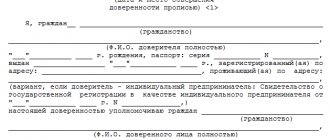In accordance with Russian legislation, the execution of any real estate transaction requires the collection of many documents and visits to a number of government agencies. For a modern busy person, this is not always convenient, so registering real estate under a general power of attorney can help in some way.
Below in this article we will talk about what a general power of attorney is, how it is drawn up and what actions can be performed with their help, as well as what dangers may lie in wait for the principal.
What types of powers of attorney are provided for by Russian legislation?
The current civil law provides for only three types of the document in question.
If any one-time action is required, a one-time power of attorney is issued.
If the authorized person must represent the interests of the principal for a certain period of time, and at the same time perform a number of similar legal actions, then it is advisable to use a special power of attorney.
In the event that complex representation of the principal in various authorities is necessary, as well as the performance of various legal actions, a general power of attorney is issued. It is this that will be the subject of consideration in this article.
At the same time, such terms are not fixed in legislation; they are used only in the theory of civil law.
What is a general power of attorney?
A general power of attorney is a document under which the authorized person has a number of powers. According to Art. 185.1 of the Civil Code of the Russian Federation, this type of documentation is subject to mandatory notarization.
Actions under a general power of attorney always entail changes to state registers. For example, if a trustee is authorized to conclude a purchase and sale transaction, in the future it will be necessary to make adjustments to the Unified Register of Rights to Real Estate.
In essence, by issuing a general power of attorney for property, the owner transfers the right to dispose of it to a third party. It can act within the text of the paper at its discretion.
The only thing that remains inaccessible to the trustee is the execution of a deed of gift or will. It is possible to donate property using this document only if the text of the document directly states not only the right to perform this legal action, but also the data of the donee. In the case of a will, there are no exceptions - only the owner can write it.
What actions does a general power of attorney give?
The second name of this document is a general power of attorney, and this is where its essence is revealed. A power of attorney of this type covers the authority to perform almost all legally significant actions.
These include:
- transactions on the principal's bank accounts, including credit and other types of cards;
- registration and payment of loans;
- transactions with shares, bonds and other securities;
- actions for registration of inheritance;
- transactions with real estate, as well as providing it as collateral, etc. Previously, it was possible to dispose of a car by power of attorney, but this legal provision has now been abolished.
ATTENTION !!! All actions of the representative will be considered performed on behalf of the person who issued the power of attorney. And the consequences of these actions come precisely for the principal, and not for the attorney.
Considering the broad powers granted by a general power of attorney, this document is drawn up less frequently than other specified types. Most notaries either refuse to certify such a power of attorney at all, fearing accusations of complicity in fraud, or warn principals about the possible consequences of their rash actions and offer to limit the range of actions of the attorney. Indeed, in the event of a trial, problems may arise for all participants in the transaction by proxy.
What does a general power of attorney give for an apartment, house or land?
A general power of attorney provides the owner’s representative with very extensive powers:
- carry out actions to prepare all necessary documents relating to the property;
- participate in organizing transactions;
- sign documentation on behalf of the owner;
- participate in financial transactions;
- manage the legal fate of the entrusted property;
- other powers provided for in the documentation.
The authorized person has the right to sell the entrusted property, lease, exchange, pledge and perform other actions if they are provided for within the document.
In addition to general powers of attorney, there are two more types of powers of attorney:
- one-time – intended to perform a specific action once;
- special – issued for a specific period for specific actions.
As a rule, both types of documents are used to prepare papers for transactions. For example, the owner can entrust this action to a realtor or a lawyer hired for these purposes.
It is impossible to conduct a transaction and transfer property rights to another person using a one-time or special power of attorney. This can only be done with a general document certified by a notary. Moreover, the text of the document must specify the specific property and the type of the planned transaction.
What risks may a person who issues a general power of attorney face?
A general power of attorney is very popular with various types of scammers. What risks does its registration entail?
The most common crimes are committed in the context of the sale and purchase of real estate. The fraudster, who was instructed to sell the apartment, often disappears with the money after a successful transaction, not forgetting to first revoke the power of attorney. Sometimes the owner of the property himself is involved in the fraud.
IMPORTANT !!! If the principal is still inclined to draw up a general power of attorney, then it is worth listening to the advice of experienced lawyers and drawing up the document for a shorter period rather than a maximum of three years. And all actions that the authorized person is authorized to perform must be formulated very clearly to prevent double interpretation. In addition, it is better to choose one of the principal’s family members as an attorney. But this is not a complete guarantee of security against dishonest actions of a representative.
A fiduciary cannot make a transaction under a power of attorney in relation to himself.
What is a general power of attorney for real estate?
As we have already said, a power of attorney is a legal document that transfers ownership of a certain property. But even though the powers are extensive, they are not complete, therefore it is advisable to very carefully choose the person who will represent the interests of the owner. In addition, according to the legal norms of the Russian Federation for 2021, there are three types of powers of attorney:
- Special. It is intended to perform several actions on behalf of the property owner.
- One-time. This type of power of attorney is used for one-time representation of the owner. With its help you can perform only one operation.
- General or general. This document is drawn up for the complete transfer of rights to the property.
According to the law, the right to sell can only be obtained if the last type of agreement has been completed. But in the case when the first two types are signed, the rights of the principal are limited in many ways. Here are the rights that a power of attorney grants to the person who signs it:
Dear readers!
Our articles talk about typical ways to resolve legal issues, but each case is unique. If you want to find out how to solve your specific problem, please contact the online consultant form on the right →
It's fast and free!
Or call us by phone (24/7):
If you want to find out how to solve your particular problem, call us by phone. It's fast and free!
+7 Moscow,
Moscow region
+7 Saint Petersburg,
Leningrad region
+7 Regions
(free call for all regions of Russia)
- A person can perform all actions with the real estate the rights to which are transferred to him. And the boundaries of rights are indicated in the document, of course, if the power of attorney is drawn up correctly;
- Also, the authorized representative can take full part in the bureaucratic nuances of the transaction, namely, represent the rights of the owner in various authorities, draw up documents, etc.;
- Among other things, the trustee can perform transactions related to legal issues, including signing documents on behalf of the owner;
- May be involved in financial matters during the transaction. But it is important that when drawing up a general power of attorney for real estate, a special note is placed in the document.
Naturally, the specifics of each power of attorney, as well as the rights it opens to the owner, depend on the type of document. After all, a one-time and general power of attorney are completely different papers. Having a general power of attorney, a person has the right not only to sell real estate, but also to enter into rental, exchange, etc. transactions. You can even put an apartment as collateral.
In what cases is a general power of attorney terminated?
- when the period indicated therein expired;
- voluntary refusal of the attorney from the powers granted by the power of attorney;
- bankruptcy of the principal if, according to the law, he has lost the right to issue powers of attorney;
- death of the represented person, as well as restriction of his legal capacity or complete deprivation of it;
- recognition of the principal as missing;
- revocation by the principal of the issued power of attorney. In relation to the general power of attorney, it is also notarized, as is its issuance. In the case of a general power of attorney, this is a painful procedure, since it will be necessary to notify all individuals and legal entities with whom the attorney interacted within the framework of his powers;
- division, merger, consolidation or complete liquidation of the company that issued the power of attorney;
- death or restriction of legal capacity of the attorney, as well as if he is declared missing.
General procedure for registering a general power of attorney
Despite the fact that the legislator has equated powers of attorney issued by other persons (not notaries) to notarized ones, a general power of attorney is most often certified by a notary. To avoid fraud, you should choose a notary yourself. If possible, you should not contact the notary whom your attorney strongly recommends. This may be part of a chain of criminal acts.
IMPORTANT !!! There are no legal requirements regarding which particular notary the principal must choose. Absolutely any representative of the notary has the right to certify the power of attorney with his signature and official seal.
The state fee for this notary service is quite small and amounts to only 200 rubles. Its size is the same for the entire territory of the Russian Federation.
Experienced lawyers also advise entrusting the drawing up of a power of attorney to a notary or a lawyer you know in order to avoid the risks associated with delegating your powers. After all, a document brought by an attorney may leave the principal without all his funds. Because the average citizen, as a rule, is ignorant of the intricacies of legal formulations and may find himself in the position of a victim of fraudulent actions. But it is worth remembering that the notary will not draw up any document for free, and accordingly, this will increase the costs of the transaction.
The period for which a general power of attorney is issued is a maximum of three years. But, as a rule, it is issued for a year.
How to issue a general power of attorney for the sale of an apartment?
To issue a general power of attorney, the owner of the apartment must personally appear before the notary who works with the address of its location. In this case, the presence of a citizen who will act as a proxy at the time of drawing up the document is not necessary.
It is important to remember that the notary does not actually draw up a power of attorney, but certifies its legality. Therefore, to properly prepare the document, it is better to contact a qualified lawyer.
Required documents
A general power of attorney drawn up in relation to a residential property is a serious legal document, the execution of which requires complete and reliable identification data of both parties.
Therefore, in order to issue and certify it, the originals of the following documents are required:
- passports of the principal (homeowner);
- passports of the citizen who will be granted legal powers (trusted person);
- a document of title confirming the owner's ownership of a specific property.
Contents of the power of attorney
A general power of attorney for the sale of an apartment must reflect in its content a detailed description of the powers of the authorized person. If the principal decides to authorize a person with this document to fully carry out the transaction, then there must be a note indicating the right to receive money.
In addition, an integral part of the general power of attorney is an identical agreement, which must reflect the following mandatory details:
- full meaning of the date and place of issue;
- personal, passport and registration data of one or more principals;
- personal, passport and registration data of the authorized representative;
- address and technical characteristics of the apartment being sold, including indication of the size of shared ownership;
- a complete description of the actions of the trustee with the property, permitted by its owner;
- term of transfer of rights (validity of the document);
- signature of the apartment owner (principal).
Sample
There is no specific unified sample of a general power of attorney for the sale of housing. It all depends on the type of powers being transferred, which are different in each specific case.
The law allows a power of attorney to be issued in any form, but at the same time strictly obliges it to be certified by a notary in the same region in which the pre-sale apartment is located.
Price
The final cost of a general power of attorney is based on two types of services:
- registration of the document itself will cost an average of 2,000 rubles;
- The state fee for its notarization is set at 200 rubles.
You also need to be prepared that when selling your home you will have to spend additional money to pay for the contract. On average, its cost will cost no more than 12 thousand rubles.
What should a standard power of attorney include?
What information will a standard power of attorney contain:
- They always start with the wording of the name, i.e., in this case, “General (general) power of attorney.”
- All personal data of the person is in accordance with the passport data.
- The place where it was issued, as well as the exact date it was issued.
- The period during which the power of attorney will be valid.
- If the power of attorney concerns the performance of actions in relation to an apartment or other similar property, then a complete description of the property must be included as a separate paragraph.
- That list of actions, the authority to perform which the principal delegates to his representative. General wording “all actions”, “in all organizations” should be avoided in the power of attorney, as this creates a temptation to abuse one’s powers and enrich oneself at the expense of the principal.
- It is imperative to include a clause prohibiting the transfer of powers of the attorney to a new person. Otherwise, the attorney can easily shift his obligations onto the shoulders of another person with all the ensuing consequences for the trustee.
- It is advisable to insert in a separate paragraph into the power of attorney a list of those state and municipal bodies, institutions and organizations where his representative will represent the interests of the principal.
- Lawyers advise to use a trick and indicate the result that the attorney must achieve, for example, concluding a transaction to purchase an apartment as the property of the principal.
- Trustee's signature.
There is no standard form or sample filling. In each specific case, the necessary actions are taken into account.
General power of attorney for an apartment: form
The general power of attorney form is here.
Power of attorney
(general)
City __________, __ ________ 200_.
I, the undersigned, _____________________________ __ _______19__, born at the address: ___________ st. _______ d. __ apt. ____ passport of a citizen of the Russian Federation ____________, issued by the Department of Internal Affairs of the district _________ of the city __________ ___ __________ 20__, department code ____________, with this power of attorney I authorize a citizen of the Russian Federation _________________________________ residing at the address: ___________ st. _______ d. __ apt. ____ passport of a citizen of the Russian Federation ____________, issued by the Department of Internal Affairs of the district _________ of the city __________ ___ __________ 20__, division code ____________, to be my representative in all institutions and organizations, regardless of form of ownership, on all issues relating to my interests, to manage and dispose of all my property, in whatever it may be and wherever it is located, in accordance with which to enter into transactions permitted by law, including with apartments and other real estate, in particular: buy, sell, accept as a gift, exchange, determining in all cases the amounts, terms and other conditions at your discretion; make payments on concluded transactions, register the relevant agreements and the transfer of rights under them with the competent authorities, remove me from the state registration register and put me on the state registration register at a new place of residence, accept an inheritance or refuse it, receive property, money, valuables due to me papers, and other documents on all grounds from all persons and organizations, manage accounts in the Central Bank of Russia and its divisions, commercial, savings and other banks with the right to open and close accounts, deposit and receive any amounts of money, receive postal, telegraphic, valuable and all kinds of correspondence and parcels, conduct business on my behalf in all organizations, conduct civil and criminal cases in all judicial institutions with all the rights granted by law to the plaintiff, defendant, third party and victim, including the right to file a statement of claim, termination peace proceedings, recognition or refusal in whole or in part of claims, changing the subject of the claim, appealing a court decision, obtaining a writ of execution, with the right to receive property and money.
The power of attorney was issued without the right of substitution and is valid for three years.
| ____________________________ | Signature |
___ ______ 20___, this power of attorney is certified by me ________________, a notary of the city _______, the license is registered in the State Register No. _______ and issued by the Department of Justice of the Administration of ___________ dated __ _________ 20__.
The power of attorney was signed by ________________________________________________ in my presence. His identity has been established and his legal capacity has been verified.
| Official seal | Registered in the register under No. ____ Notary fee charged ___ rub. according to receipt No. ____ dated ___ ______ 200_. | |
| Notary: | _______________FULL NAME. | |
Rights and obligations of the principal and attorney
The attorney is obliged:
- fulfill your obligations towards the principal in good faith;
- in some cases, provide a report on the funds spent;
- act only within the limits determined by the document in question;
- take all measures within his power to carry out the actions specified in the power of attorney.
The attorney has the right:
- require the principal to provide the funds necessary to perform actions under the power of attorney,
- demand the principal compensation for material damage caused by the performance of actions specified in the power of attorney;
- at any time declare a refusal of the powers granted to him by power of attorney.
In some cases, the attorney acts on a fee basis; accordingly, he also has the right to demand payment of the remuneration due to him under the terms of the transaction.
The person who issued the general power of attorney is obliged to:
- bear responsibility for the actions of the attorney and their consequences, if they were committed without exceeding the powers of the attorney;
- reimburse the authorized person for the expenses that he incurred as part of the performance of his duties (but only if there is reliable evidence of this, for example, receipts, checks, etc.);
- pay the remuneration due under the terms of the contract;
- compensate for property damage caused by the execution of the trustee’s instructions.
The principal has the right:
- require the representative to fulfill all his duties;
- demand a report on the funds spent and supporting documents;
- revoke the attorney's power of attorney at any time without giving a reason.
What is the process for registering real estate by power of attorney?
With the participation of a representative, purchase and sale transactions, as well as deeds of gift for an apartment and other real estate, can be completed. This need arises due to the large number of actions that need to be performed to register real estate. Also, attorneys are often entrusted with collecting the necessary documents, of which there is also a considerable list.
When completing a purchase and sale transaction, the attorney takes on the responsibility of completing all formalities under this agreement. This will include not only the preparation of the entire package of necessary documents and the signing of the agreement itself on behalf of the principal, but also the submission of documents for registration of this transaction in Rosreestr. Along with the documents required by law, the representative submits to the Registration Chamber a copy of his power of attorney.
IMPORTANT !!! The original power of attorney is presented directly when submitting documents for registration of the transaction to Rosreestr. The identity of the principal is confirmed by a passport, from which it is necessary to make a photocopy and also submit it to the registration service.
Regardless of whether documents are submitted in person or through a proxy, the period for consideration by Rosreestr remains the same, about 10 days.
Also, a trusted person can participate in the execution of a gift agreement, for example, on the part of the donee, if he was unable to personally attend the transaction. Also in this case, the attorney will be responsible for all actions to re-register the apartment as the property of the donee.
General power of attorney for real estate with the right to sell - nuances
Drawing up a general power of attorney with the right to sell has its advantages, disadvantages and caveats. For example, you should not issue such a document to a realtor. For a specialist hired as a legal assistant and accompaniment of the transaction, a special or one-time power of attorney is sufficient. Both will be enough to collect papers and transfer the advance payment.
This is important to know: Residential building and residential building: difference in 2021
Dear readers! We cover standard methods for solving legal problems, but your case may be unique. We will help you find a solution to your problem for free
— simply call our legal consultant at:
It's fast and free ! You can also quickly get an answer through the consultant form on the website.
Be extremely careful! There are often scammers among realtors and real estate agents. The deception scheme used is as follows: a person receives a power of attorney with the right to collect and submit the necessary documentation. Then, the title papers are duplicated, the owner's signature is forged, and the property becomes the property of another person. After this, buying and selling takes place.
In order not to take risks, issue a power of attorney with the right to sell only to those people whom you really trust. It is established by law that an authorized citizen will not be able to sell an apartment, house or plot to himself. However, he may well do this in favor of his accomplice.
Buyers are very skeptical of owner trustees. Everyone is afraid of scammers, so it is better if the owner participates in the transaction without intermediaries.
However, sometimes there is no other way out but to involve a trusted person. But even in this case, it is rarely possible to remain completely aloof. Buyers will most likely require at least one meeting with the owner to verify its real existence.
In what cases can the actions of an attorney be challenged in court?
Challenging the actions of an attorney in court is a lengthy and legally complex process. He will require the presentation of a solid evidence base, otherwise the court will leave the concluded deal in force.
A power of attorney can be declared invalid and transactions under it can be challenged in a number of cases:
- If the principal died and the attorney continued to act on his behalf.
- If the power of attorney is issued by a minor, and not by his parent or other legal representative.
- If the attorney renounced his powers under the power of attorney, but in fact continued to carry out actions to dispose of real estate owned by the principal.
- If the principal was in a state of intoxication of any kind at the time of making the power of attorney.
- If, at the time of transfer of his powers, the trustee had a mental illness that prevents him from soberly assessing his actions and their consequences (even when this illness is discovered later, but it will be proven that at the time of execution of the power of attorney this type of mental disorder already existed).
- The power of attorney was issued using false documents.
- Misleading the principal, which seems to be the most difficult
provable basis.
- The power of attorney was obtained using coercion of any kind, which may expose the attorney to criminal liability.






